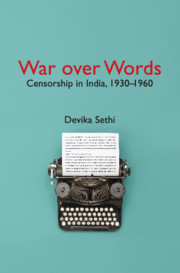Book contents
- Frontmatter
- Dedication
- Contents
- Acknowledgements
- List of Abbreviations
- Introduction
- Part I Guarding the State, Protecting the Public: Censorship Policies and Practices in the 1930s
- Part II Protests and Publicity: Banning Non-Indian Authors
- 3 Critiques of Indian Society: Katherine Mayo's Long Shadow
- 4 ‘Hurt’ or ‘Hatred’? Publications by Non-Indians Offensive to Indian Muslims
- Part III Political or Military? Censorship in India during the Second World War
- Part IV The Censored Turn Censors: Freedom and Free Speech
- Conclusion
- Epilogue
- Bibliography
- Name Index
- General Index
3 - Critiques of Indian Society: Katherine Mayo's Long Shadow
from Part II - Protests and Publicity: Banning Non-Indian Authors
Published online by Cambridge University Press: 26 April 2019
- Frontmatter
- Dedication
- Contents
- Acknowledgements
- List of Abbreviations
- Introduction
- Part I Guarding the State, Protecting the Public: Censorship Policies and Practices in the 1930s
- Part II Protests and Publicity: Banning Non-Indian Authors
- 3 Critiques of Indian Society: Katherine Mayo's Long Shadow
- 4 ‘Hurt’ or ‘Hatred’? Publications by Non-Indians Offensive to Indian Muslims
- Part III Political or Military? Censorship in India during the Second World War
- Part IV The Censored Turn Censors: Freedom and Free Speech
- Conclusion
- Epilogue
- Bibliography
- Name Index
- General Index
Summary
Ironically, almost all books by foreign authors that were considered worthy of being banned in India were measured against an extremely controversial book that was not itself banned: American journalist Katherine Mayo's extremely critical account of India, titled Mother India, published in 1927. In fact, of the four books that Mayo wrote on India over the course of almost a decade, only the last one (The Face of Mother India) was banned (in 1936). Mother India, a polemic against Indians’ suitability for self-rule, was considered ‘a must-read for many in British colonial circles in the 1920s’, and had 20 printings between 1928 and 1930. At the time of its publication in 1927, the allegation was frequently made in India that the GOI had assisted in its production financially and otherwise, that the India Office had been complicit in ensuring that it was widely distributed and read, and that the book itself was intended to slow down constitutional reform (by indicting Indians as unsuitable for it). All these allegations were denied repeatedly by the GOI and the India Office. In her full-length work on this book and its legacy, Mrinalini Sinha has conclusively established that the India Office had in fact asked the GOI to assist Mayo, and that Mayo's central thesis (about Hindu promiscuity) was suggested to her by an India Office official.
The controversy over the GOI's failure to ban Mayo's Mother India was revived, or referred to, in the case of Mayo's other books as well as in other cases of negative assessments of Indian society by foreign authors. However, scholars have focused their attention exclusively on the controversial Mother India, to the exclusion of Mayo's other books. This chapter will begin by examining three of Mayo's lesser-known books on India, including the banned one, in order to isolate the factors that led to the banning of some books and not others. Subsequently, it will discuss banned books by other non-Indian authors.
Katherine Mayo's Slaves of the Gods (1929)
In March 1929, the GOI informed the India Office in London about the forthcoming publication of Mayo's Slaves of the Gods, which was described in an intercepted press telegram as ‘a collection of stories of Hindu India, prominence being given to child-wife, temple prostitute, etc.
- Type
- Chapter
- Information
- War over Words , pp. 63 - 90Publisher: Cambridge University PressPrint publication year: 2019



